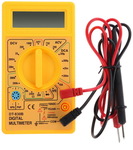after a cheap multimeter?
here you go.
I have this model (bought from DSE for $8 5 years ago.
does everything you need it to do.
Item specifics
Operating Mode:Handle
Display Type:Digital DisplayOperating
Temperature:0 - 50 ℃
Measuring Inductance Range:200 Ohm-2000K Ohm
Measuring Capacitance Range:Top
Measuring Voltage Range:
Max AC Voltage range:1000VDIY Supplies:Electrical
Measuring Current Range:Max AC Current:10A
Measuring Resistance Range:200 Ohm-2000K Ohm
Dimensions:70X126X28 mm
Model Number:102951.02
Color available:Yellow, Black
Diode Check:2.8V/1mA
Battery Check:1.5V, 9V
Power:9V battery (6F22)(not Include in the packaging)
Mod WARNING: This item does not carry the required Electrical Safety Certifications for Sale or Supply (and/or installation) in Australia. It may be dangerous to use this device.






How exactly does this test your digital multimeter ?